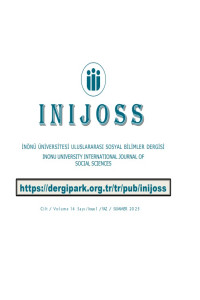Öz
Gılgamış Destanı on dokuzuncu yüzyılın ikinci yarısındaki keşfinden bu yana çok sayıda akademik çalışmanın ilgi odağı olagelmiştir. Destanın zengin dokusu ve derinliği, çok farklı disiplinlerden gelen araştırmacıların çok geniş kapsamlı bakış açılarından metni değerlendirebilmelerine olanak sağlamıştır. Bunlardan bazıları Nietzsche’nin güç istenci kavramı, bastırılmış ensest dürtüler, ideal arkadaşlık kavramı ve ideal devlet yapısının kurgulanması olarak sıralanabilir. Ancak bu çalışma, destanı farklı bir perspektiften değerlendirmeyi amaçlamaktadır. Bu çalışmada metindeki dilbilimsel kodların ve göstergelerin sembolik olarak evrensel bireyleşme süreçlerine işaret ettiği ve belli bir kültürel yapının kurgulanması noktasında araçsallaştırıldıkları ileri sürülmektedir. Çalışmanın kuramsal çerçevesini ise Lacancı psikoanaliz kuramı oluşturmaktadır. Bu bağlamda destanda Jacques Lacan’ın semiyotik, sembolik, Büyük Öteki ve Gerçek gibi kavramlarının izi sürülmüş ve bu kavramların metinde yer alan karakterler ve olay örgüsü içerisindeki bağlantısal anlamları irdelenmiştir. Dolayısıyla, bu çalışmanın temel argümanı, metinde yer alan kod ve göstergelerin Lacancı psikoanalizin kavramsal çerçevesine birebir uyduğu ve bu bağlamda da insanlık durumunun en temel öğeleri olan bireyleşme ve kültür inşası süreçlerini sembolik olarak yansıttığıdır.
Anahtar Kelimeler
Gılgamış Destanı Jacques Lacan Semiyotik Sembolik Büyük Öteki Gerçek
Kaynakça
- Anonymous. (2021). A New Translation of the Ancient Epic Gilgamesh with Essays on the Poem, Its Past, and Its Passion (Trans. Sophus Helle). Yale University Press.
- Heidegger, Martin (1996). Being and Time. A Translation of "Sein und Zeit" (Trans. Joan Stambaugh). SUNY Press.
- Helle, Sophus (2021). Introduction. In A New Translation of the Ancient Epic Gilgamesh with Essays on the Poem, Its Past, and Its Passion (pp. vii-xxx). Yale University Press.
- Helle, Sophus(2021). “Dying to be Read”. In A New Translation of the Ancient Epic Gilgamesh with Essays on the Poem, Its Past, and Its Passion (pp. 182-200). Yale University Press.
- Helle, Sophus(2021). “Kings, Women, Monsters”. In A New Translation of the Ancient Epic Gilgamesh with Essays on the Poem, Its Past, and Its Passion (pp. 201-218). Yale University Press..
- Lacan, Jacques (1988). The Seminar, Book II: The Ego in Freud’s Theory and in the Technique of Psychoanalysis (pp. 1954-55). Norton.
- Lacan, Jacques(1994). The Four Fundamental Concepts of Psychoanalysis. Penguin.
- Lacan, Jacques(2001). “The Mirror Stage as Formative of the Function of the I as Revealed in the Psychoanalytic Experience.” In The Norton Anthology of Theory and Criticism (pp. 1285-1302). Norton.
- Tekin Alpay, Gönül (2022). Simurg’un Kanadı: Mitoloji ve Edebiyat Makaleleri. Yeditepe.
Öz
The Epic of Gilgamesh, has been the focus of unmatched attention since its discovery in the second half of the nineteenth century. The epic is so richly composed that it has been the object of critique of scholars from various disciplines and has been evaluated from a wide range of different perspectives some of which are Nietzschean concept of will to power, repressed incestuous desires, the representation of the ideal friendship, the establishment of an ideal state order. However, this study focuses on the linguistic codes and signs employed in the epic that symbolically project the processes of individuation and that have been instrumentalised for the establishment and reinforcement of a certain cultural order. Interpreted under a Lacanian light, Lacanian concepts such as the semiotic, the symbolic, the Big Other and the Real can be traced as represented through the characterization and action that takes place in the text. Therefore, the main argument of this study revolves around the ways in which the codes, signs and characterizations that exist in the text fit in the conceptual framework of Lacanian psychoanalysis in terms of the individuation and culturation processes that are inextricable parts of the human condition.
Anahtar Kelimeler
The Epic of Gilgamesh Jacques Lacan The Semiotic Order The Symbolic Order The Big Other The Real
Kaynakça
- Anonymous. (2021). A New Translation of the Ancient Epic Gilgamesh with Essays on the Poem, Its Past, and Its Passion (Trans. Sophus Helle). Yale University Press.
- Heidegger, Martin (1996). Being and Time. A Translation of "Sein und Zeit" (Trans. Joan Stambaugh). SUNY Press.
- Helle, Sophus (2021). Introduction. In A New Translation of the Ancient Epic Gilgamesh with Essays on the Poem, Its Past, and Its Passion (pp. vii-xxx). Yale University Press.
- Helle, Sophus(2021). “Dying to be Read”. In A New Translation of the Ancient Epic Gilgamesh with Essays on the Poem, Its Past, and Its Passion (pp. 182-200). Yale University Press.
- Helle, Sophus(2021). “Kings, Women, Monsters”. In A New Translation of the Ancient Epic Gilgamesh with Essays on the Poem, Its Past, and Its Passion (pp. 201-218). Yale University Press..
- Lacan, Jacques (1988). The Seminar, Book II: The Ego in Freud’s Theory and in the Technique of Psychoanalysis (pp. 1954-55). Norton.
- Lacan, Jacques(1994). The Four Fundamental Concepts of Psychoanalysis. Penguin.
- Lacan, Jacques(2001). “The Mirror Stage as Formative of the Function of the I as Revealed in the Psychoanalytic Experience.” In The Norton Anthology of Theory and Criticism (pp. 1285-1302). Norton.
- Tekin Alpay, Gönül (2022). Simurg’un Kanadı: Mitoloji ve Edebiyat Makaleleri. Yeditepe.
Ayrıntılar
| Birincil Dil | İngilizce |
|---|---|
| Konular | Dünya Dilleri, Edebiyatı ve Kültürü (Diğer) |
| Bölüm | Makaleler |
| Yazarlar | |
| Erken Görünüm Tarihi | 26 Haziran 2025 |
| Yayımlanma Tarihi | 30 Haziran 2025 |
| Gönderilme Tarihi | 1 Ağustos 2024 |
| Kabul Tarihi | 7 Mayıs 2025 |
| Yayımlandığı Sayı | Yıl 2025 Cilt: 14 Sayı: 1 |


